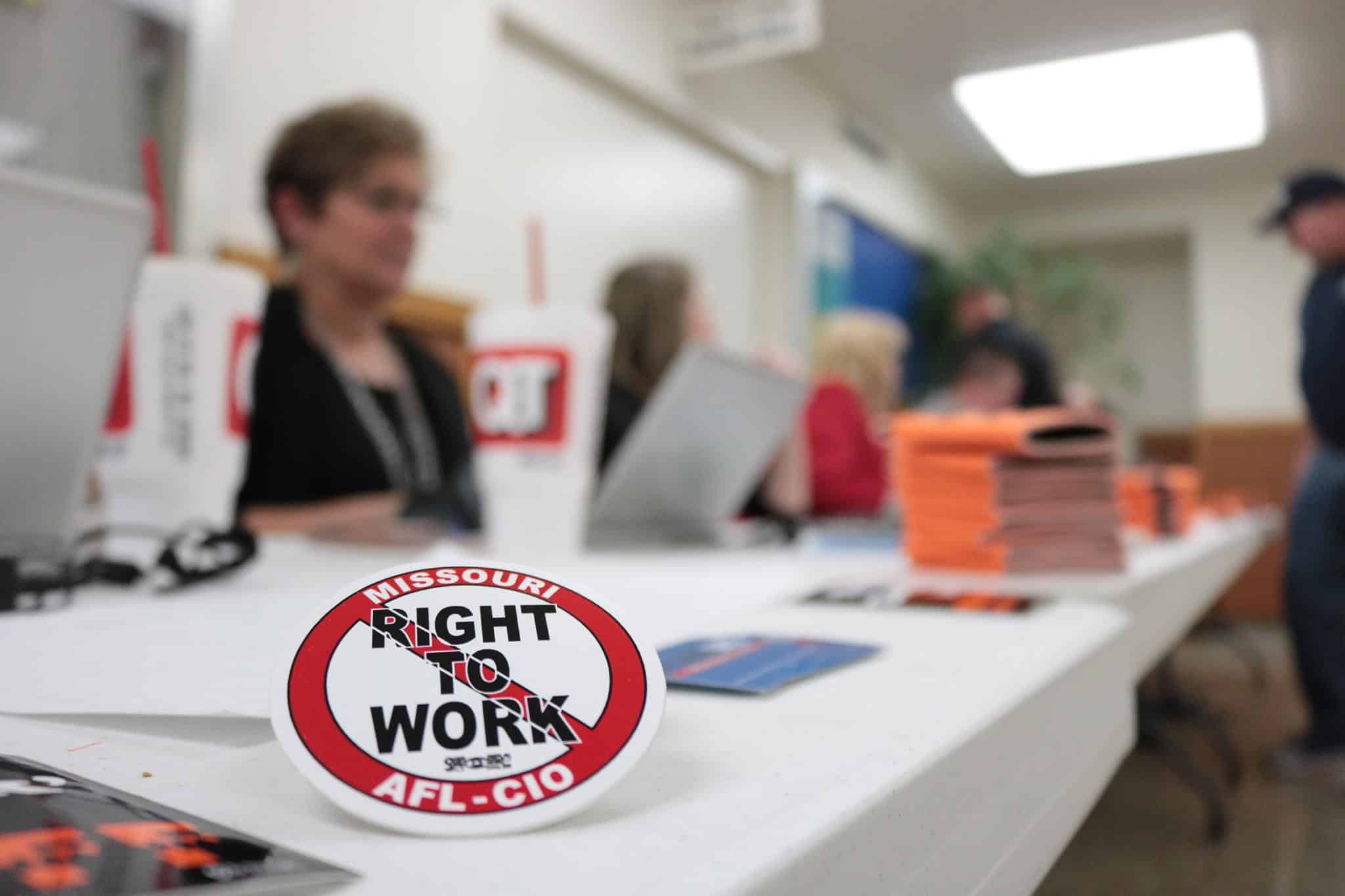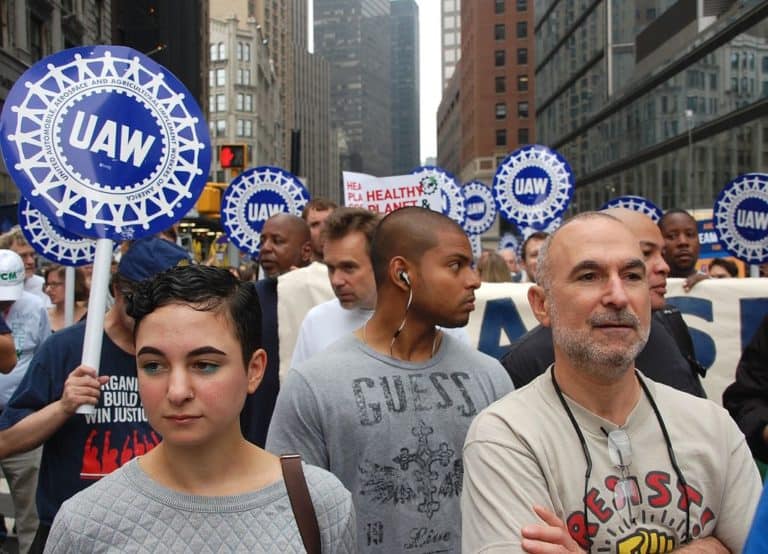On August 7th, Missouri voters will decide the fate of Prop. A — a ballot initiative that could repeal the state’s newly passed “right-to-work” law.
Last year, then-Governor Eric Greitens signed Senate Bill 19, a so-called “right-to-work” bill that poses a dire threat to Missouri unions. Despite the name, a right-to-work law wouldn’t guarantee Missouri residents a job. Instead, the law would allow workers in union workplaces to opt out of paying union dues — while still benefiting from the union’s collective bargaining efforts. Right-to-work bills thus create an obvious collective action problem: if people can opt out of paying their fair share without losing out on benefits, some will, draining union funding and drastically undermining the union’s efforts to lift wages and improve benefits for all.
But before the law could go into effect, Missouri unions and civil rights organizations gathered 300,000 petitions calling to put the measure on the ballot — well above the 100,000 signatures required to force a referendum and put a repeal measure to a public vote. A “yes” vote means that the union-busting bill bill go into effect; a “no” vote will repeal it.
Now, the right-to-work law is on hold — and the August 7th vote could repeal it entirely.
Right-to-work supporters argue that the bill would create jobs in Missouri; former Governor Greitens justified the bill by arguing that job growth in right-to-work states was twice as high as job growth in non-right-to-work states. But (as PolitiFact pointed out) that figure is misleading, in part because the study that generated it did not account for differences in population growth. In reality, there’s little proof that right-to-work creates jobs. On the one hand, most states that had high job growth between 1990 and 2015 were right-to-work — but so were a majority of states that saw a decrease in jobs.
By contrast, there’s strong evidence that right-to-work undermines union membership and depresses wages. According to an analysis from the left-leaning Economic Policy Institute, if the right-to-work measure passes, 60,000 fewer Missouri workers would be covered a union contract. Predictably, that means lower wages. EPI found that “wages in RTW states are 3.1 percent lower than those in non-RTW states, after controlling for a full complement of individual demographic [and] state macroeconomic” factors. For your typical full-time worker, that means $1,588 less per year — which is no small chunk of change at a time when 63 percent of Americans don’t have the savings to cover an unexpected $500 expense.
It’s not just union workers that lose out in a right-to-work state, either. High rates of union membership are correlated with lower levels of income inequality, and unions can force even nonunion workplaces to raise wages to attract talent. Right-to-work could rob workers of those benefits. You might say the union-busting measure is less “right-to-work,” then “right-to-work-for-less.”
The heated campaign pits grassroots union energy against a GOP-controlled state government pushing hard to salvage the anti-union law. Greitens resigned in disgrace in May during an investigation into allegations that he’d blackmailed a woman he had an affair with and skirted campaign finance laws. But one of his last acts as Governor was to move the ballot initiative from November ballot to the August primary election in an effort to suppress votes; the lower turnout in primary elections (compared to the general) is believed to favor Republicans.
Still, in spite of all this, the repeal campaign just might pull it off. In 2011, Ohio voters overwhelmingly rejected a bill to limit collective bargaining rights for public sector workers. In fact, in 1978, Missouri voters defeated a very similar right-to-work proposal by a whopping 20 point margin. Union density in Missouri has fallen precipitously since 1978 — today only about 7.5 percent of private-sector Missouri workers are unionized — but a poll last week issued by the Missouri Times showed the repeal campaign ahead, with 56 percent support.
If Missouri repeals right-to-work in August, it’ll send a powerful rebuke of Janus and a clear signal that voters want to protect organized labor — renewed proof that, even as unions are suffering bitter losses in courthouses, the movement is growing. After all, millennials are joining unions at a rapid clip and the next generation of workers views significantly more favorably that past ones do. If workers are going to lose at the Supreme Court, it might be time to put labor rights on the ballot, where we can win.










Daily News & Commentary
Start your day with our roundup of the latest labor developments. See all
July 11
Regional director orders election without Board quorum; 9th Circuit pauses injunction on Executive Order; Driverless car legislation in Massachusetts
July 10
Wisconsin Supreme Court holds UW Health nurses are not covered by Wisconsin’s Labor Peace Act; a district judge denies the request to stay an injunction pending appeal; the NFLPA appeals an arbitration decision.
July 9
the Supreme Court allows Trump to proceed with mass firings; Secretary of Agriculture suggests Medicaid recipients replace deported migrant farmworkers; DHS ends TPS for Nicaragua and Honduras
July 8
In today’s news and commentary, Apple wins at the Fifth Circuit against the NLRB, Florida enacts a noncompete-friendly law, and complications with the No Tax on Tips in the Big Beautiful Bill. Apple won an appeal overturning a National Labor Relations Board (NLRB) decision that the company violated labor law by coercively questioning an employee […]
July 7
LA economy deals with fallout from ICE raids; a new appeal challenges the NCAA antitrust settlement; and the EPA places dissenting employees on leave.
July 6
Municipal workers in Philadelphia continue to strike; Zohran Mamdani collects union endorsements; UFCW grocery workers in California and Colorado reach tentative agreements.